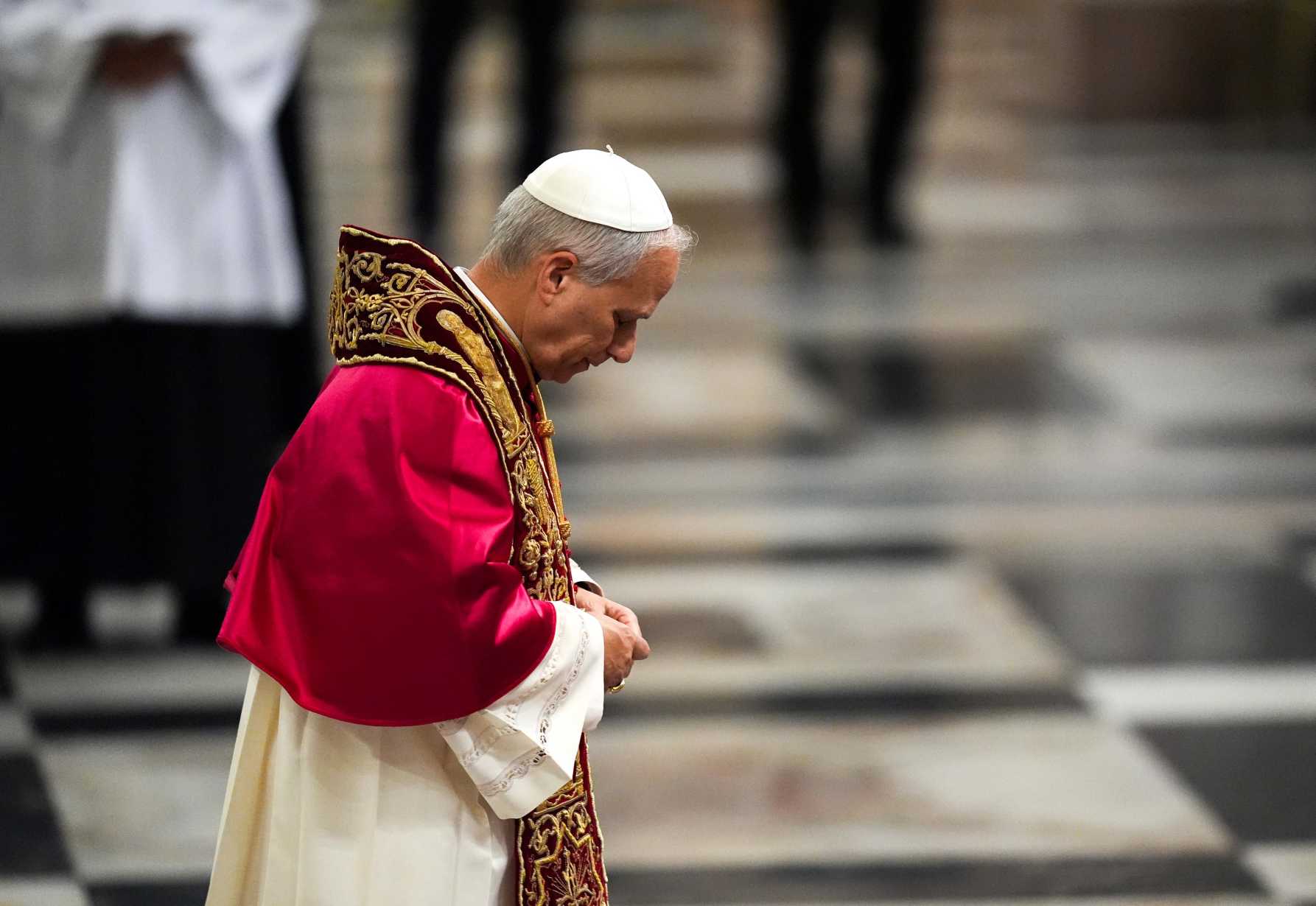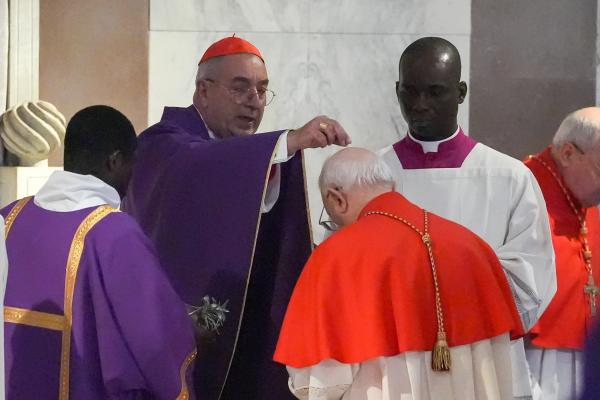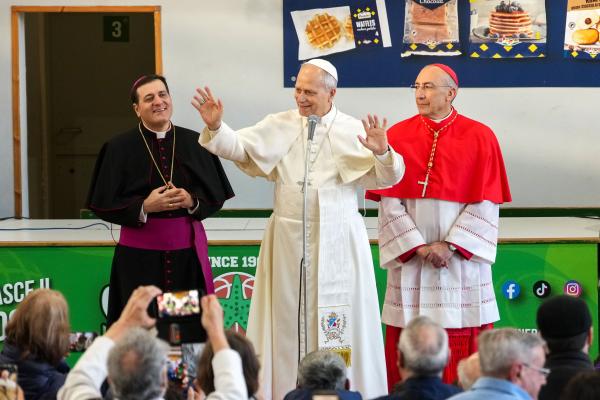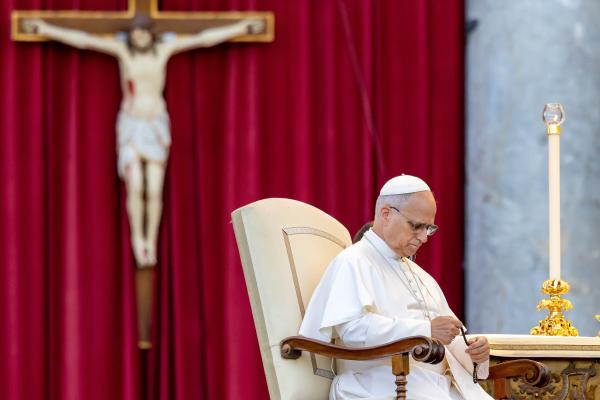In interview, pope talks about abuse crisis, Trump, following Pope Francis
A new biography of Pope Leo includes the transcript of a long interview with him on a variety of topics, including the abuse crisis, U.S. President Donald Trump, the war in Gaza, Vatican policy toward China, the church's openness to LGBTQ Catholics, the role of women in the church, and the celebration of the pre-Vatican II Mass in Latin.
 Cindy Wooden
Cindy Wooden

Pope Leo XIV prays in front of the tomb of St. Paul during a visit to the Basilica of St. Paul Outside the Walls in Rome in this file photo from May 20, 2025. (CNS photo/Lola Gomez)
VATICAN CITY (CNS) -- Clerical sexual abuse continues to be "a real crisis," one that the Catholic Church still must learn to deal with, particularly in improving the way it helps survivors while also ensuring the rights of the accused are respected, Pope Leo XIV said.
"It would be naive for myself or for anyone" to think that dismissing the offender and giving the victim a financial settlement completely solves a case, "as if those wounds are just going to go away because of that," the pope said in an interview for a book by Elise Allen, a journalist.
For Allen's biography, "Leo XIV: Citizen of the World, Missionary of the XXI Century," Pope Leo spoke about a range of issues, including the abuse crisis, U.S. President Donald Trump, the war in Gaza, Vatican policy toward China, the church's openness to LGBTQ Catholics, the role of women in the church, and the celebration of the pre-Vatican II Mass in Latin.
Excerpts of Allen's July 30 interview, her second interview with the pope, were published Sept. 14, but the full transcript was released Sept. 18 in conjunction with the publication of the Spanish edition of the book by Penguin Peru.
Pope Leo said that while the church has enacted tougher laws and policies to prevent and punish abuse, it cannot say that the crisis is over.
"This will continue to take time because victims must be treated with great respect and with an understanding that those who have suffered very deep wounds because of abuse sometimes carry those wounds for their entire life," he said.
At the same time, he said, there is the "complicating factor" of ensuring that the rights of the accused are respected.
"Statistics show that well over 90% of people who come forward and make accusations, they are authentically victims. They are telling the truth. They are not making this up," he said. "But there have also been proven cases of some kind of false accusation. There have been priests whose lives have been destroyed because of that."
And even when the accusation is well founded, the pope said, the accused has a right to a presumption of innocence and due process.
"But even saying that at times is cause of greater pain for the victims," Pope Leo acknowledged.
On the topic of President Trump, Pope Leo said he had not met the president nor spoken to him, although his brother Louis has and "has been very outspoken about his political views."
Trump "at times has made clear" his concern about questions of human dignity and promoting peace, the pope said. "In those efforts I would want to support him."
"The United States is a power player on the world level, we have to recognize that," he said, but "sometimes decisions are made more based on economics than on human dignity," such as the current immigration policy, and the church will continue to challenge that approach.
Pope Leo declined to get into "some of the things that have been said about the episcopacy in the United States and the relationship between church and politics." However, he said, "the fact that I am American means, among other things, people can't say, like they did about Francis, 'He doesn't understand the United States; he just doesn't see what's going on.'"
Regarding the war in Gaza, Pope Leo told Allen that "the word genocide is being thrown around more and more. Officially, the Holy See does not believe that we can make any declaration at this time about that. There's a very technical definition about what genocide might be, but more and more people are raising the issue, including two human rights groups in Israel."
On China, and most of the other issues the pope discussed in the interview, he said he would follow the basic path laid out by Pope Francis.
"I in no way pretend to be wiser or more experienced than all those who have come before me," Pope Leo said.
However, before becoming pope he made several visits to China, and Pope Leo said he is "in ongoing dialogue with a number of people, Chinese, on both sides of some of the issues," particularly concerning cooperating with the government so the church can operate openly while showing respect for Chinese Catholics who have undergone oppression for their refusal to join the government-controlled church.
The pope said he also intends to continue Pope Francis' welcoming approach to LGBTQ Catholics while not changing church teaching, especially the Catholic vision of marriage as being between one man and one woman committed to each other for life and open to having children.
"What I'm trying to say is what Francis said very clearly when he would say, 'todos, todos, todos.' Everyone's invited in, but I don't invite a person in because they are or are not of any specific identity. I invite a person in because they are a son or daughter of God," he said.
He said he also would "continue in the footsteps of (Pope) Francis" by appointing women to leadership roles in the church, "recognizing the gifts that women have that can contribute to the life of the church."
Studying the question of ordaining women to the diaconate will continue, he said, but he did not expect church policy to change any time soon, especially since the permanent diaconate is still not valued throughout the church. "Why would we talk about ordaining women to the diaconate if the diaconate itself is not yet properly understood and properly developed and promoted within the church?" he asked.
On continuing requests for greater access to celebrations of the pre-Vatican II Mass, Pope Leo said the Mass has been caught up in "a process of polarization -- people have used the liturgy as an excuse for advancing other topics. It's become a political tool, and that's very unfortunate."



